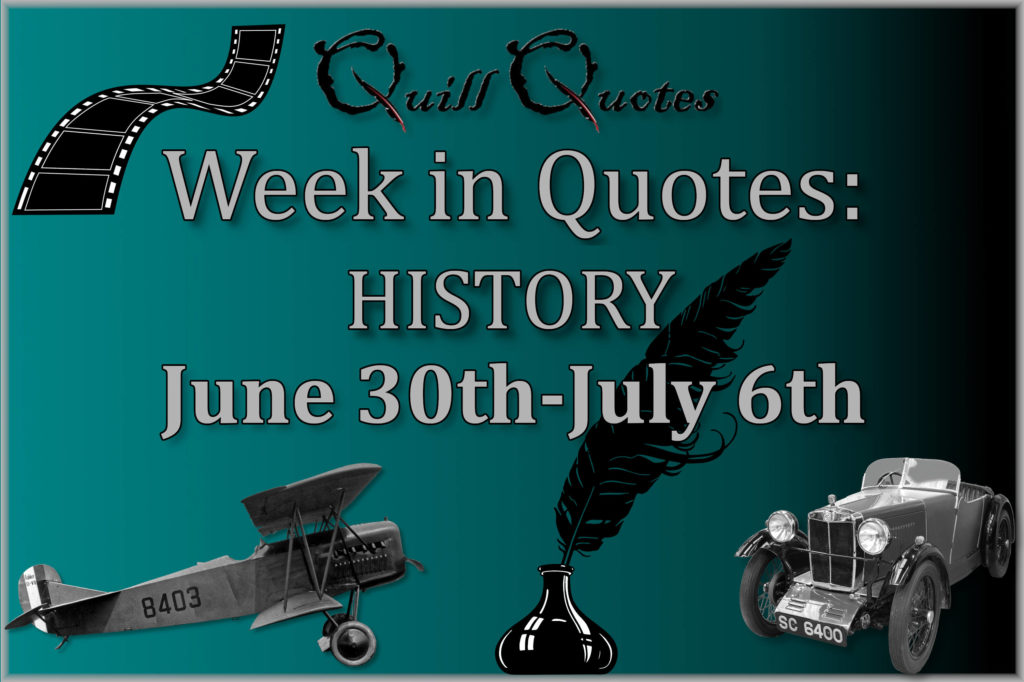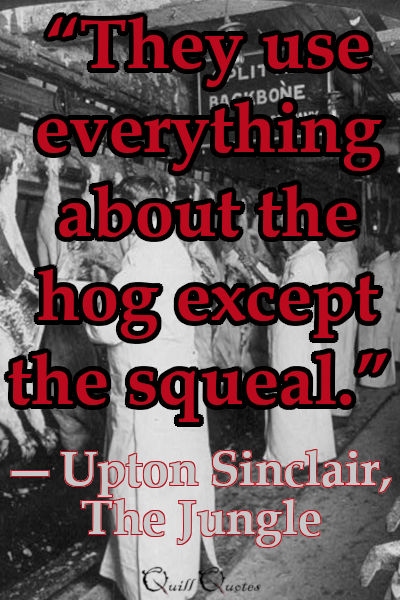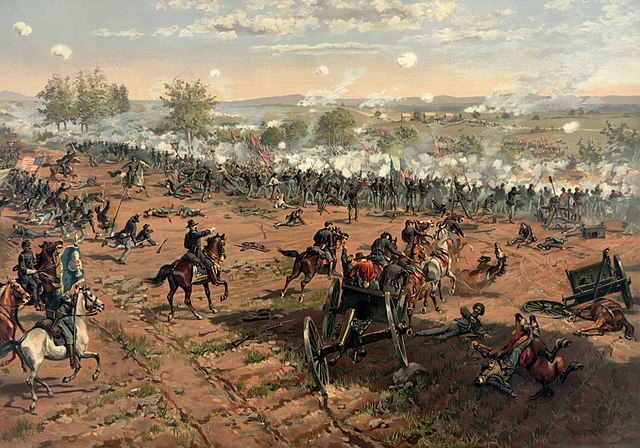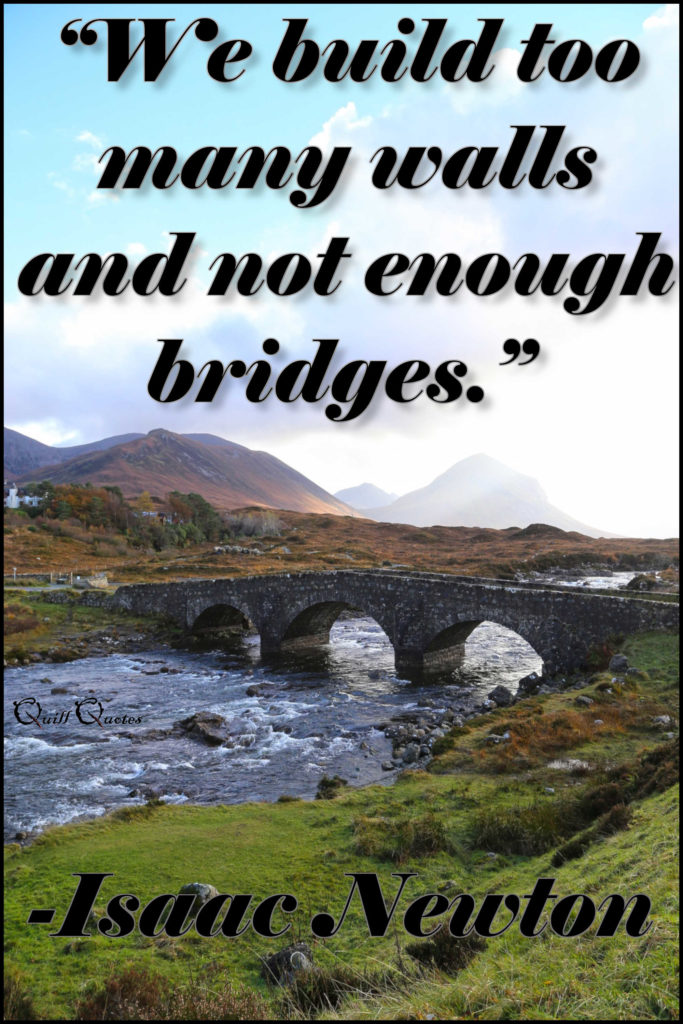There is always much to learn from quotes and their historical significance. Read on for a collection of quotes and general history from June 30th – July 6th.

June 30, 1906
“I aimed at the public’s heart, and by accident I hit it in the stomach.”
– Upton Sinclair
On June 30th, 1906, President Theodore Roosevelt signed the Pure Food and Drug Act into law. The law’s main purpose was to require accurate product labeling to raise standards in the food and drug industries. Enforcement of the law was entrusted to the Bureau of Chemistry, which later became the Food and Drug Administration (FDA). Public support for the Pure Food and Drug Act was driven in large part by the muckraking journalists of that era. For instance, Upton Sinclair’s The Jungle was instrumental in exposing the corruption and unsanitary practices in the Chicago meat packing industry. However, Sinclair’s primary goal, to expose the miserable working conditions faced by poor immigrants, was largely ignored.

July 1, 1968
“Japan learned from the bombings of Hiroshima and Nagasaki that the tragedy wrought by nuclear weapons must never be repeated and that humanity and nuclear weapons cannot coexist.”
– Daisaku Ikeda
On July 1, 1968, the Treaty on the Non-Proliferation of Nuclear Weapons was signed. This international treaty, commonly known as the Non-Proliferation Treaty (NPT), is best summarized by Thomas Graham Jr., “the NPT non-nuclear-weapon states agree never to acquire nuclear weapons and the NPT nuclear-weapon states in exchange agree to share the benefits of peaceful nuclear technology and to pursue nuclear disarmament aimed at the ultimate elimination of their nuclear arsenals.” Today, 190 countries participate in the NPT. The 5 countries who do not are: India, Israel, North Korea, Pakistan, and South Sudan.
July 2, 1937
“Obviously I faced the possibility of not returning when first I considered going. Once faced and settled there really wasn’t any good reason to refer to it.”
– Amelia Earhart
Amelia Earhart and Fred Noonan disappeared during their attempt to fly around the globe on July 2, 1937. Starting from Oakland, California, they had made it about 22,000 miles to Lae, New Guinea. The remaining 7,000 miles to complete the circumnavigation of the globe was to be covered in 3 stops: Howland Island, Honolulu, Hawaii, and Oakland, California. However, they never reached Howland Island and search efforts were unable to locate them. With Earhart’s following as an accomplished aviator and feminist, speculation about their disappearance and fascination with her life continues to this day.

July 3, 1863
“If you go to Gettysburg and take the time, maybe take a tour, maybe just drive around, read some of the monuments, read some of the plaques, you will come away changed.”
– Jeff Shaara
July 3, 1863, was the third and final day of the Battle of Gettysburg during the American Civil War. Confederate General Robert E. Lee led the Army of Northern Virginia north into Pennsylvania and was met by Union Major General George Meade’s Army of the Potomac at Gettysburg. After numerous skirmishes and assaults over the first two days of battle, Lee ordered an all-out infantry assault against the center of the Union line on Cemetery Ridge. This assault, known as Pickett’s Charge, was repelled by the Union army and forced the Confederates to retreat. The Battle of Gettysburg is one of the costliest in US history, with between 46,000 and 51,000 casualties.

July 4, 1776
“We hold these truths to be self-evident, that all men are created equal, that they are endowed, by their Creator, with certain unalienable Rights, that among these are Life, Liberty, and the pursuit of Happiness.”
– Thomas Jefferson, The Declaration of Independence
The United States Declaration of Independence was approved on July 4, 1776. The Declaration was a formal explanation of why the Second Continental Congress voted for independence from Great Britain, listing 27 grievances against King George III. Lesser known fact, the vote for independence, known as the Lee Resolution, was actually passed on July 2nd. Although it’s been celebrated in various forms since 1777, US Congress made Independence Day, July 4th, a federal holiday in 1870.
July 5, 1687
“Truth is ever to be found in simplicity, and not in the multiplicity and confusion of things.”
– Isaac Newton
On July 5, 1687, Isaac Newton’s seminal work Philosophiæ Naturalis Principia Mathematica, or simply the Principia, was first published. The Principia is considered one of the most important works in the history of science, stating Newton’s laws of motion and law of universal gravitation. Newton’s work revolutionized physics and formed the foundation for classical mechanics and calculus.

July 6, 1944
“Without promotion, something terrible happens… nothing!”
– P. T. Barnum
On July 6th, 1944, the Ringling Brothers and Barnum & Bailey Circus tent caught fire during an afternoon performance in Hartford, Connecticut. Known as the Hartford circus fire, it was one of the worst fire disasters in US history with 167 dead and more than 700 injured. The fire spread quickly due to the use of paraffin wax dissolved in gasoline to waterproof the tent. While fireproofing methods existed at the time, the army had priority on the fireproofing liquid for WWII and the Ringling Brother’s application for it had been denied.
In case you missed last week’s quotes, see History June 23rd – 29th.
To never miss a Quill Quotes post, please subscribe to our free Email Newsletter and follow us on Social Media.
Leave a Reply